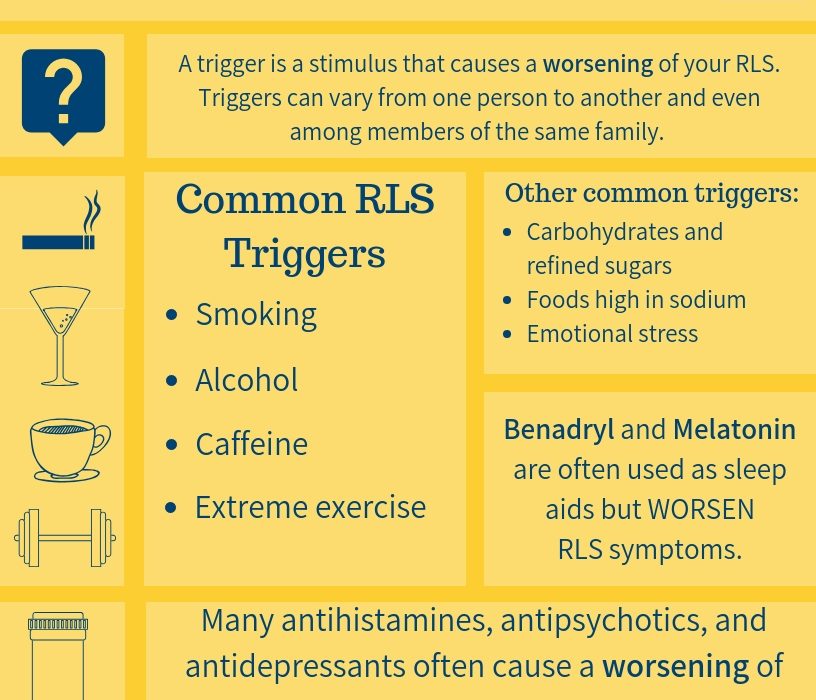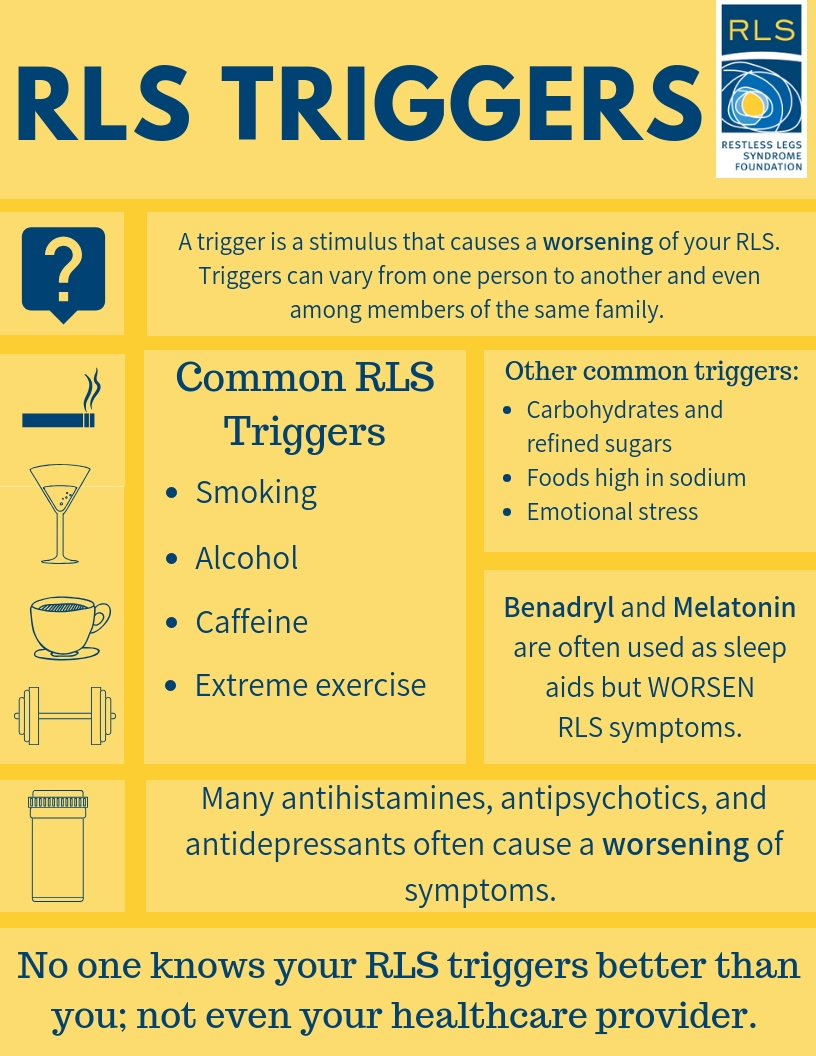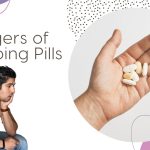Have you ever wondered if certain foods or medications can trigger Restless Leg Syndrome (RLS)? Well, you’re in the right place! In this article, we’ll take a closer look at whether or not there is a connection between RLS and our diet or the medications we take. So, grab a cup of coffee (unless it triggers your RLS!), sit back, and let’s dive into the fascinating world of RLS triggers.
Restless Leg Syndrome is a condition that affects millions of people worldwide, causing uncomfortable sensations and an irresistible urge to move their legs. While the exact cause of RLS is still unknown, researchers have been exploring various factors that may contribute to its onset and exacerbation. One such factor is the potential role of certain foods and medications in triggering RLS symptoms. So, let’s explore whether what we eat or the pills we pop can have an impact on our restless legs. Stay tuned for some surprising insights!
Can Certain Foods or Medications Trigger RLS?
Restless Leg Syndrome (RLS) is a condition characterized by an irresistible urge to move the legs, often accompanied by uncomfortable sensations. While the exact cause of RLS is still unknown, there are various factors that can trigger or worsen the symptoms. One of these factors is the consumption of certain foods or medications. In this article, we will explore the relationship between RLS and diet or medication and discuss how they can potentially affect the condition.
The Impact of Foods on RLS
Certain foods have been found to trigger or exacerbate RLS symptoms in some individuals. These foods typically contain substances that can interfere with the body’s dopamine levels or cause inflammation. Dopamine is a neurotransmitter that plays a crucial role in regulating movement, and any disruptions in its levels can contribute to RLS symptoms.
One group of foods that may trigger RLS symptoms is those high in sugar and refined carbohydrates. These foods can cause fluctuations in blood sugar levels, which may worsen the symptoms of RLS. Additionally, foods that contain additives, such as MSG (monosodium glutamate), have been reported to trigger RLS symptoms in some individuals. It is important to note that not everyone with RLS will be affected by these foods, and the triggers can vary from person to person.
The Role of Medications in RLS
Certain medications have also been linked to RLS symptoms. It is important to note that not all individuals who take these medications will develop RLS or experience worsened symptoms. However, it is crucial to be aware of the potential side effects and discuss any concerns with a healthcare professional.
One class of medications that has been associated with RLS symptoms is antihistamines. These medications, commonly used for allergies or as sleep aids, can disrupt dopamine levels, leading to RLS symptoms. Other medications, such as certain antidepressants and antipsychotics, have also been reported to cause or worsen RLS symptoms. If you suspect that your medication is contributing to your RLS symptoms, it is important to consult with your healthcare provider to discuss possible alternatives.
Managing RLS Triggers
While certain foods and medications may trigger RLS symptoms, it is important to remember that triggers can vary from person to person. What may worsen symptoms for one individual may not affect another. However, if you have RLS and notice a correlation between certain foods or medications and your symptoms, it may be beneficial to make some dietary or medication adjustments.
To manage potential triggers, it is recommended to maintain a balanced diet that includes whole foods and minimizes the consumption of processed and sugary foods. Additionally, keeping track of your symptoms and any potential triggers can help you identify patterns and make informed decisions about your diet and medication choices.
If you suspect that a medication you are taking is worsening your RLS symptoms, it is crucial to consult with your healthcare provider. They can evaluate your medication regimen and explore alternative options that may be better suited for managing your symptoms.
In conclusion, while certain foods and medications may trigger or worsen RLS symptoms, it is important to approach these triggers on an individual basis. Each person may have different sensitivities, and what affects one person may not affect another. By staying mindful of your diet and medication choices and working closely with your healthcare provider, you can better manage your RLS symptoms and improve your overall quality of life.
Key Takeaways: Can certain foods or medications trigger RLS?
- Certain foods and medications can trigger Restless Leg Syndrome (RLS).
- Foods high in caffeine, such as coffee and chocolate, may worsen RLS symptoms.
- Some medications, like antihistamines and antidepressants, can also trigger or worsen RLS.
- Avoiding trigger foods and discussing alternative medications with a doctor may help manage RLS.
- It’s important to remember that triggers can vary from person to person, so it’s essential to pay attention to individual reactions.
Frequently Asked Questions
What foods can trigger Restless Leg Syndrome (RLS)?
While there is no definitive list of foods that can trigger Restless Leg Syndrome (RLS), certain substances have been known to worsen symptoms in some individuals. These include caffeine, alcohol, and high-sugar foods. It is important to note that not everyone with RLS will experience symptom aggravation from these foods, as triggers can vary from person to person. If you notice that consuming certain foods exacerbates your RLS symptoms, it may be helpful to limit or avoid them.
Additionally, some individuals have reported that certain food additives, such as monosodium glutamate (MSG) and artificial sweeteners, can also trigger RLS symptoms. Keeping a food diary and tracking your symptoms can help you identify potential triggers and make necessary dietary adjustments.
Can medications worsen Restless Leg Syndrome (RLS) symptoms?
Yes, certain medications have been associated with worsening Restless Leg Syndrome (RLS) symptoms. Medications that are known to potentially exacerbate RLS include certain antidepressants, antihistamines, and anti-nausea drugs. It is important to note that not everyone will experience RLS symptom aggravation from these medications, as individual reactions can vary.
If you are taking any medications and notice a correlation between starting the medication and an increase in RLS symptoms, it is recommended to consult with your healthcare provider. They may be able to adjust your medication regimen or suggest alternative options that are less likely to worsen RLS symptoms.
Are there any foods that can help alleviate Restless Leg Syndrome (RLS) symptoms?
While there is no specific diet that has been proven to cure or completely alleviate Restless Leg Syndrome (RLS), some individuals have reported finding relief by making certain dietary changes. Including foods rich in iron, such as spinach, lean meats, and fortified cereals, may be beneficial for individuals with RLS, as iron deficiency has been associated with the condition.
In addition, incorporating foods high in magnesium, such as nuts, seeds, and leafy greens, may also be helpful, as magnesium plays a role in muscle relaxation. However, it is important to consult with a healthcare professional before making any significant dietary changes or starting any supplements.
Can caffeine worsen Restless Leg Syndrome (RLS) symptoms?
For some individuals with Restless Leg Syndrome (RLS), caffeine consumption has been reported to worsen symptoms. Caffeine is a stimulant that can affect the nervous system and potentially increase restlessness and discomfort in the legs. If you notice that consuming caffeine, such as coffee or energy drinks, worsens your RLS symptoms, it may be beneficial to decrease or eliminate your caffeine intake.
However, it is important to note that not everyone with RLS will experience symptom aggravation from caffeine. It can vary from person to person, so it is recommended to pay attention to your own body’s response and make adjustments accordingly.
Are there any medications that can help manage Restless Leg Syndrome (RLS) symptoms?
Yes, there are medications available that can help manage Restless Leg Syndrome (RLS) symptoms. These medications include dopamine agonists, such as pramipexole and ropinirole, which work by increasing dopamine levels in the brain. Dopamine is a neurotransmitter involved in the regulation of movement and may help alleviate RLS symptoms.
Other medications that may be prescribed for RLS include anticonvulsants, benzodiazepines, and opioids. However, it is important to note that medication options and dosages should be determined by a healthcare professional based on individual needs and considerations. It is recommended to consult with a healthcare provider to discuss the best treatment approach for managing your RLS symptoms.
Final Summary: Can certain foods or medications trigger RLS?
After exploring the connection between certain foods and medications and their potential to trigger Restless Legs Syndrome (RLS), it is clear that there is some evidence to suggest that these factors can indeed play a role. While the exact mechanisms are not fully understood, it is important to be aware of the potential triggers and make informed choices about what we consume.
When it comes to diet, some studies have pointed out that caffeine and alcohol may exacerbate RLS symptoms in certain individuals. It’s not to say that everyone with RLS should completely eliminate these substances from their lives, but it may be worth considering reducing their consumption if you experience frequent discomfort. On the other hand, incorporating foods rich in iron, folate, and magnesium, such as leafy greens, lentils, and bananas, could potentially have a positive impact on RLS symptoms.
In terms of medication, it is crucial to consult with a healthcare professional before making any changes to your current regimen. Some medications, like certain antidepressants and antihistamines, have been associated with RLS symptoms. However, it is important to note that individual responses may vary, and what triggers RLS in one person may not have the same effect on another. The key is to remain vigilant and communicate openly with your healthcare provider to find the best treatment approach for you.
In conclusion, while there is no definitive answer to whether certain foods or medications can trigger RLS, it is clear that there is a potential relationship. By being mindful of our diet and discussing medication options with healthcare professionals, we can take proactive steps towards managing and alleviating RLS symptoms. Remember, everyone’s experience with RLS is unique, so it’s important to find what works best for you and prioritize your overall well-being.




